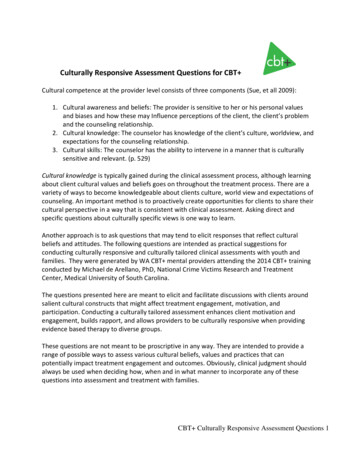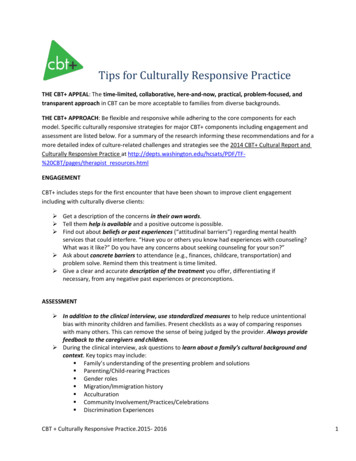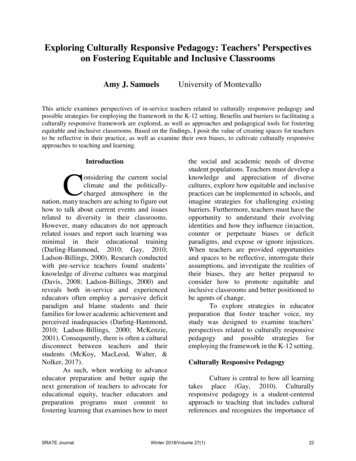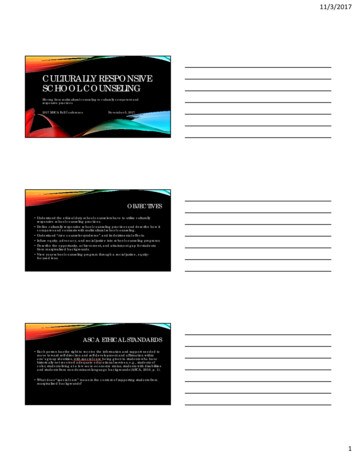
Transcription
Culturally Responsive Assessment Questions for CBT Cultural competence at the provider level consists of three components (Sue, et all 2009):1. Cultural awareness and beliefs: The provider is sensitive to her or his personal valuesand biases and how these may Influence perceptions of the client, the client’s problemand the counseling relationship.2. Cultural knowledge: The counselor has knowledge of the client’s culture, worldview, andexpectations for the counseling relationship.3. Cultural skills: The counselor has the ability to intervene in a manner that is culturallysensitive and relevant. (p. 529)Cultural knowledge is typically gained during the clinical assessment process, although learningabout client cultural values and beliefs goes on throughout the treatment process. There are avariety of ways to become knowledgeable about clients culture, world view and expectations ofcounseling. An important method is to proactively create opportunities for clients to share theircultural perspective in a way that is consistent with clinical assessment. Asking direct andspecific questions about culturally specific views is one way to learn.Another approach is to ask questions that may tend to elicit responses that reflect culturalbeliefs and attitudes. The following questions are intended as practical suggestions forconducting culturally responsive and culturally tailored clinical assessments with youth andfamilies. They were generated by WA CBT mental providers attending the 2014 CBT trainingconducted by Michael de Arellano, PhD, National Crime Victims Research and TreatmentCenter, Medical University of South Carolina.The questions presented here are meant to elicit and facilitate discussions with clients aroundsalient cultural constructs that might affect treatment engagement, motivation, andparticipation. Conducting a culturally tailored assessment enhances client motivation andengagement, builds rapport, and allows providers to be culturally responsive when providingevidence based therapy to diverse groups.These questions are not meant to be proscriptive in any way. They are intended to provide arange of possible ways to assess various cultural beliefs, values and practices that canpotentially impact treatment engagement and outcomes. Obviously, clinical judgment shouldalways be used when deciding how, when and in what manner to incorporate any of thesequestions into assessment and treatment with families.CBT Culturally Responsive Assessment Questions 1
Child Rearing Practices/ParentingQuestions for Caregivers: What shapes your parenting decisions?How do your values or beliefs shape your parenting decisions?What are some things you do as a parent that are the same as what your parents did?What are some things you do differently from your parents?What was/is it like to grow up in your family? How has this affected your view ofparenting and family now?In your family, who is responsible for childrearing and care?Who is the leader in your family? What makes that person the leader?Questions for Children: What are your responsibilities in your home?What are you expected to take responsibility for in terms of your brothers and sisters?What are the rules in your house? What are you allowed to do on your own?What are the differences between you and your parents about what is expected of thekids in your family?What kind of things do you want to do that your parents disagree with? Or what thingsdo your parents do that you disagree with?Gender RolesQuestions for Caregiver and Children/Youth What are the different duties family members have in your family? The mother? Thedad? The kids?Who is the “boss” or, who is in charge in your family? What are the responsibilities ofthe “boss’? What would you change if you were the boss?How are decisions made in your family? What’s the process?Who is responsible for the providing, protecting and taking care of family members?Are there differences in what males and females are expected to do?Acculturation Migration/Immigration HistoryQuestions for Caregivers and Children/Youth When did you/your family come to the area?CBT Culturally Responsive Assessment Questions 2
Where were you born? What area are you from?What countries does your family come from?How long have you lived here? What brought you here?What was it like to grow up in your home country?Family /Community FocusQuestions for Caregivers and Children/Youth Tell me about the traditions/celebrations/rituals your family participates in.What times of the year or for what purposes does your family get together?What are some special things you like to do with your family?Do your beliefs match those of your family? If so, how? If not, how are they different?What holidays or other celebrations do you celebrate as a family? Are they moretraditional or are they more American celebrations?What is your role in your family?What are your favorite foods and when do you eat them?What does a typical day at your house look like?If I were to walk into your home, what would I see, hear, smell?What do you like best about where you live? Why?What are some things you do together with your family?What are your strong points? What are the things you like in your family? What are thethings you don’t like in your family?Is there anything you would change about your family traditions or practices?Where does everybody sleep in your family? Where do you sleep?Are you a part of any larger communities? Which communities? What do you get out ofbeing part of the different communities?What is important for me to know about how you grew up?What’s it like in your neighborhood? Do you get along or feel welcome by neighbors?Tell me about that.What are some important activities that you and your grandparents do together?Discrimination ExperiencesQuestions for Caregivers and Children/Youth Have you ever been treated poorly because of your beliefs/ethnicity/race, etc.? Whatare some of the ways your have been treated poorly?Have you ever felt different from others because of your beliefs/ethnicity/race, etc.What are some of the ways you felt different?CBT Culturally Responsive Assessment Questions 3
What are some wrong assumptions people have made about you or your family that hascaused problems?Religious/Spiritual Beliefs and PracticesQuestions for Caregivers and Children/Youth What kinds of spiritual or religious beliefs are important to you and your family?Do you feel part of a religious/spiritual community? What would you like to tell meabout that?Do you have any favorite holidays/traditions/celebrations? Which ones are the mostimportant for your family, and why?What religious or spiritual practices do you follow?Do you go to church? Tell me about going to churchDo you pray? What are your beliefs about prayer?How do your beliefs affect your daily life?Where is God in all of this?Views of Mental Health and Mental Health TreatmentQuestions for Caregivers and Children/Youth How would people in your family explain what you’re going through right now and whyyou (your child) are getting counseling?Has anyone in your family been in counseling before? What do you know about it?Does your culture have a perspective on mental health therapy or counseling?Where do you or your family get help/support when a family member is having a hardtime?When there are troubles and needs in your family, what do you do? Who do you turn tofor help?What does mental health therapy or counseling mean to you?Have you and anyone in your family been in counseling before? What was that like?What is your idea about what happens in counseling?What are things your culture does that help with your sadness, anxiety, bad experiencesor other troubles?What were things you did in your country that helped with your sad feelings anddistress? What ideas do you have for what would work in this country?Who is the main person you go to if you want help or want to talk about somethingimportant?Who keeps you feeling strong and supported?What helps you feel more comfortable to talk about difficult things?CBT Culturally Responsive Assessment Questions 4
Are there ways your culture has for handling trauma or other really bad lifeexperiences?LanguageQuestions for Caregivers and Children/Youth What languages do you speak at home vs. at school or in the community? With familyvs. friends/teachers?What language(s) do different family members speak at home/to each other/to others?Sex/Sexual Identity/OrientationQuestions for Youth What are ways you think are okay for boys and girls to show they care about eachother?When do you think it is okay to have sex with someone else?Do you have some rules for when people decide to have sex? What are those rules?Do you like boys or girls or both or neither? Or maybe you don’t know?Have other counselors/teachers ever said something to you that offended you aboutwhat they think of you personally?General/Nonspecific/Wrap upQuestions for Caregivers and Children/Youth I have asked you a lot of questions. Do you have any questions for me about theassessment/counseling? Is there something you want to tell me that we haven’t talkedabout?What are some things I may have missed in the questions I’ve asked?Do you go by any other name than what is listed? What name would you like me to callyou?Is there anything else about your background, culture or identity that you think isimportant for me know to help you.CBT Culturally Responsive Assessment Questions 5
CBT Culturally Responsive Assessment Questions 1 Culturally Responsive Assessment Questions for CBT Cultural competence at the provider level consists of three components (Sue, et all 2009):










